Hi all! Happy to see that you’re so excited about the cocoa buckwheat granola. I ate a bowl of it with almond milk and blueberries this morning, and it was totally delightful.
A few weeks ago, Amanda emailed me:
…While I love your recipes and your take on vegan dining, I’m wondering when you are going to post more on the Green Recovery series or on eating disorders. I really enjoy and respect your commentary on these things. I know that you are a very busy woman and so I understand that you might not have the time available to devote to these more sensitive endeavors, but I’d love it you’d post more on that.
Amanda, thank you! Green Recovery is very dear to my heart, and so I’m thrilled to hear that my readers are attached to the series as well. It has been hard to present these meaningful stories in the midst of school bedlam, but today, I’m sharing an entry from Sarah, who blogs at Welsh Girl Eats. As you’ll see, Sarah—a recovered anorexic—has had both positive and negative experiences with vegan diet. A good many of my readers with ED histories are both fearful and intrigued by veganism (it’s one of the reasons this series felt important to me), and so I think that many of you will relate to Sarah’s story. And I hope we’ll all be able to celebrate her current journey towards a renewed commitment to veganism. Thanks, Sarah, for joining us!
Where to start!
Like many people, I have a long and complex relationship with food, but I’ll try to keep it brief. I began to associate food and my body with depression and other negative feelings in my teen years. In my early twenties I was diagnosed with IBS (constipation type) but on reflection I believe I have had IBS since I was a child. When I went to university my need to feel in control and obsession with food and weight, which had begun in earnest when I was 17 years old, escalated. Life got messy due to family problems, and there was the (self-imposed) pressure to do well at university. I had no coping mechanisms in place. I also increasingly associated food with pain due to my IBS, and at 21 I became anorexic. Luckily, I got married a year later, and for the sake of my husband and our life together I decided things had to change. I embarked on recovery myself. I reframed food in my mind as something that was healthy and necessary for life rather than something to control, limit and use to deal with my emotions. I was in recovery/recovered for a while after that and began to love food again. At 24 I found out that I had gluten and lactose intolerance which helped massively in managing my IBS.
At 26 years old I went back to university to study to be a registered nurse. Aware that university pressure was one of my triggers, I wanted it to be different this time—and it was, at first. But then began a catalogue of events and triggers led left me staring at a relapse again. Half way into my first year of school I had lost weight (just from healthy exercise, which was new for me). During the summer I had 3 months of university holidays, which worried me. I didn’t want to gain weight and feared I would due to having little to distract me from food and not being as active. My IBS had been getting worse as well. During the holidays I took up yoga which helped with stress management, and, as a natural academic, I began to research additional ways to manage my IBS.
During my research I came across many people (Gena, Elise, Lauren, Twins etc) who had been able to manage their IBS and other digestive ailments through adopting a vegan diet. Instinctively I brushed over it, thinking it was too extreme and unhealthy. On looking into it more and weighing it all up, though, I decided to give the vegan diet a go. I was determined to be diligent about it, so that I could have a healthy and balanced diet, particularly as I was already gluten-free. I had also read loads of reports on how a vegan diet had helped with weight loss and weight management. In all honesty, I did not want to lose weight. I just didn’t want to gain weight. This was an important distinction in my mind, and one which differed from my previous anorexic days. In retrospect, however, I think it was a warning sign and the wrong reason to try a vegan diet.
In August 2009 I embarked on a vegan diet. And I loved it! It helped with my IBS and I loved the way of eating; I really wanted to do it in a way that energised me and gave me strength and health – all positive motivations for sure. I did lose weigh, but it was incidental. I was eating well and enjoying food.
Towards the end of that year people started commenting on my weight being lower than pre-veganism (I was not underweight at this point), and in Summer 2010, the comments from others and the pressure to excel at university got too much. (Additionally, I hadn’t had a period for 15 months.) Those close to me hypothesised that it was due to my weight loss and vegan diet (it turns out that my lack of periods was mostly due to PCOS – polycystic ovarian syndrome – which I was diagnosed with in December 2010).
Nonetheless, being naturally anxious, and often giving too much clout to what others say to me, I started believing that it was because of my vegan diet and worried that I was relapsing. It sounds strange but people’s comments and their expressions of concern that I was anorexic again was an additional trigger. In August 2010 I became more controlling about food, and I was constantly hungry and thinking about food. My IBS was becoming awful again (no surprise really with the increased anxiety levels and ED habits), my BMI was too low, and I was using veganism (and raw veganism) as a way to be super controlling about food.
With my head in a muddle, I decided to throw in the vegan diet. Veganism became associated with weight loss and negativity rather than the initial joy I gained from eating that way. It seems that veganism, for me, has two faces. When life gets tough and I feel as though I can’t cope, it’s a way for me to be more controlling about food. When life is fine, veganism is a way that I can love food with freedom and creative expression.
Since my IBS was bad and I needed to gain weight, I thought that denouncing veganism was the way to go (note IBS and weight management were my initial reasons for trying veganism in the first place). I stopped blogging at Gluten-free Tries Vegan and stepped back from the blog world (reading and commenting on blogs, as well as blogging myself). Also, I was concerned that food/healthy living blogs were perpetuating my food, body and weight fixations.
Since then I have gained back the weight and returned to a healthy BMI, but I haven’t been happy with eating meat. I researched more about nutrition and how to have a healthy diet that contained animal products but it didn’t seem as healthy as plant-based diets. And health is something that has always been important to me (hence my training to be a nurse). And I just didn’t enjoy being omnivore again, both body and mind. I had started to count calories again, hating my body and becoming fixated on the weighing scales and how my body looked. I hadn’t adopted these behaviours and mentality since first being anorexic (and it was veganism initially that stopped me from counting calories). It was depressing. I was happy and relieved to be at a healthy weight again, but this wasn’t enough to help my mind. I wanted to reclaim my love of food.
I thought about adopting a vegan diet again but was fearful due to my recent relapse. I embarked on a predominantly vegetarian diet (although still eating meat and fish occasionally), but it STILL didn’t feel right (I know this sounds fluffy but I’m not sure how else to put it) nor did it feel entirely healthy. I really missed that joy I experienced through eating a vegan diet, prior to my relapse. So, over the last five months I have carefully been transitioning back to a vegan diet—with one major caveat. I am not committing myself to any labels whatsoever. I can’t go there, not yet at least. I’m just letting myself eat what I love, without pressure, and choosing foods that my body AND my mind enjoy. And honestly, that ends up being vegan food! I love it. My diet is plant-based by default; it is what is natural to me. And eating mostly gluten-free and vegan helps with my IBS.
In order to avoid the relapse that coincided with my first attempt at a vegan diet I am determined to do things differently this time. Whilst I want my food to be stomach-friendly, I am not going to stress about whether everything that passes my lips is vegan. May be one day I will be able to be more strict, maybe not. Importantly, my motivations are different—it is not for weight loss or management. I am disassociating veganism with weight control. It is for health and joy. Also, during the last relapse I became too fearful of grains and carbs in general. I am letting go of these fears, and am embracing my love of carbs.
Furthermore, I believe in non-violence and eating ethically. Whilst I don’t think eating meat and dairy are paradoxical to ethical eating, it is pretty difficult to navigate and source out these foods. It’s far easier to eat ethically through choosing vegan foods, than through navigating a diet containing animal foods.
I’ve also started blogging again because my love for food has returned since adopting a plant-based diet Welsh Girl Eats. I love the creativity that comes with eating a pre-dominantly vegan diet, and the energy and lightness that I feel. Whilst I have definitely come through my recent relapse, my journey with food, IBS management and mental health is still continuing; as is my transitioning to veganism. For me, balance—in body and mind—doesn’t come easily; it takes vigilance and perseverance. It is that which I am trying to achieve whilst honoring myself, my ethics and others.
What an honest, thoughtful, and generous post!
A couple of things come to mind when I read Sarah’s story. First, it strikes me that veganism seems to be a double-edged sword for many recovered men and women: it has the power to transform and heal a broken relationship with food, but the pressures to define one’s diet in a conclusive way (by saying, “I’m vegan”) can often feel triggering, and reinforce some of the control mechanisms that are germane to eating disorders.
To be totally honest, veganism (both the diet and the label) has never evoked the control and limitation that I associate with my eating disorder and relapses (it helps that I was not vegan during any of these periods, so I don’t associate plant-based food with restriction). I am, though, very sympathetic to the ways in which veganism can present these complications to people who have lived through EDs: will the vegan diet (or label) become an excuse to restrict? Will I lose weight? Will people assume I’m trying to lose weight? This series is meant to both be an honest venue for people with ED histories to talk about their relationships with plant-based diets, and (I hope!!) an example of how plant based diet can truly be a meaningful and safe path to a renewed and healed relationship with food.
Sarah illustrates well how former ED sufferers can live in fear of their family and friends’ concerns and assumptions. I think most vegans with ED histories can relate—I certainly can! I would say to Sarah (and all of you) that, if you do develop a joyous and healthy relationship with veganism, your family and friends will often learn to celebrate your choices with you. The best way to assuage their fears is simply to show them that veganism works for you—with a smile, a delicious vegan meal, and a healthy body and mind.
If your family and friends are onto something—that is, if veganism has become an unhealthy choice for you—then you should never fear taking a step back and taking a break from the lifestyle. Better to approach it with a whole heart when you’re ready, than to do it prematurely and suffer (and possibly develop negative associations). For more on this, check out my post on how all restriction is not created equal.
And use Sarah’s story as an example! Veganism isn’t going anywhere: when you’re ready for it, it will be ready for you. Focus on recovery, on finding yourself again, and then—if you’re still committed to the principles of a vegan lifestyle—find your way back, slowly and at a pace that works for you. There’s no rush, and once you do embrace veganism again, it will surely be with happiness and confidence.
xo
This post may contain affiliate links. If you use these links to buy something I may earn a commission. Visit my privacy policy to learn more.

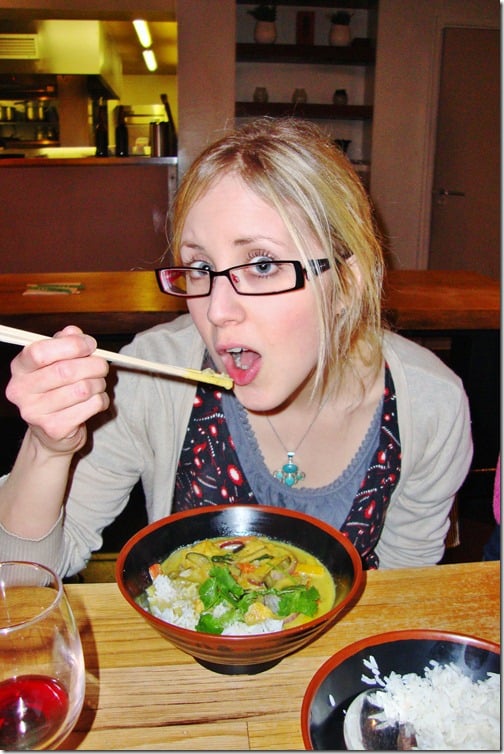
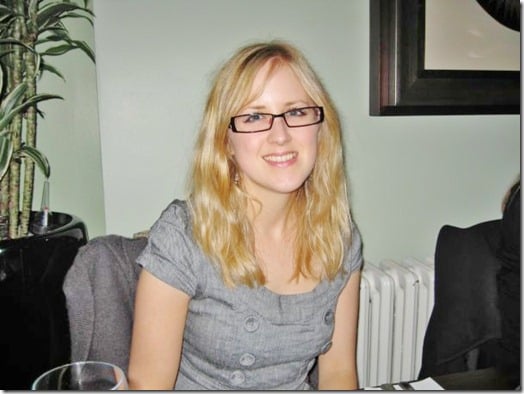
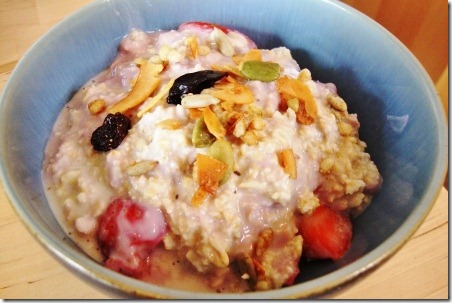
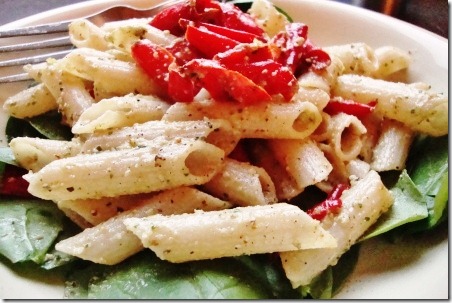
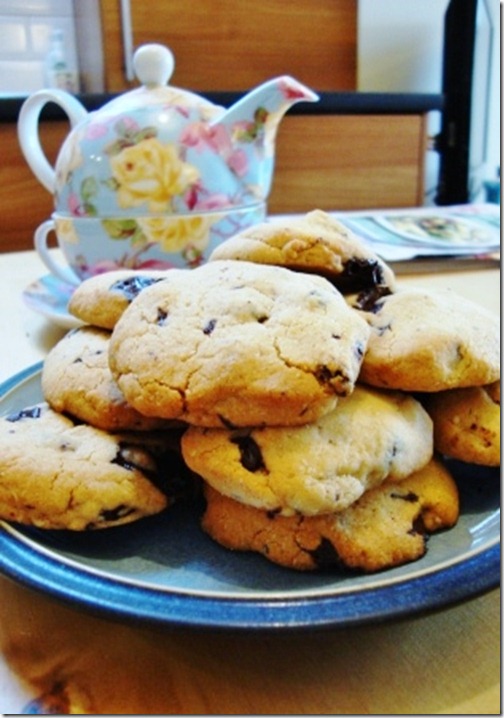
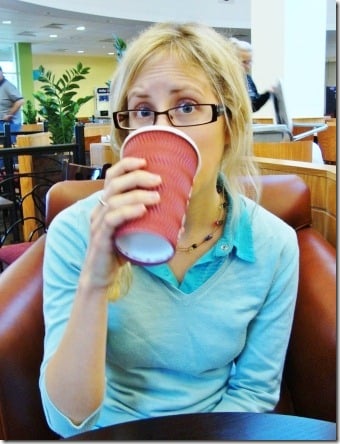
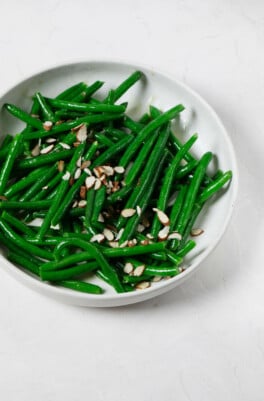
Leave a Comment
I want to switch back yo Pure Vegan. Any tips? I blog at http://spiqy.com/native-remedies
Greay guest post Sarah. I have read your blog for a while but wasn’t aware of your full story. Thank you so much for posting.
Thanks everyone for your wonderful and helpful comments. I’m glad that so many of you can relate to my story. I’ve really enjoyed reading every single one of your comments. Gena, thanks for having me 🙂 Well wishes and love to all xxx
Thanks so much to Sarah for sharing! When I first adopted veganism I definitely wasn’t ready. I was in the height of disordered eating issues and while I came to veganism for ethical reasons, I used those reasons as an excuse for restriction. Not surprisingly, between pressure on myself and pressure from outsiders (mainly a boyfriend) I reverted to omnivorism. Embracing the vegan lifestyle a few years later has been an enlightening experience, I have learned to love food for what it is and not for calories or the ability to control my body through controlling my food. Now I finally feel as though I have found peace of mind (though I’m admittedly not fully comfortable with saying I’m over my disordered eating), and my morals and actions are in line.
LOVE this post! I can really relate. I suffered from both anorexia and binge eating disorder through my late teens and early twenties, and it took a lot of soul searching and working through unpleasant childhood and emotional muck before I could make peace with food and my body for good. For me, becoming vegan earlier this year made me feel even more at peace with food- choosing to eat/not eat certain things for reasons that have nothing to do with my weight was so empowering! I appreciate and enjoy food now more than ever, and love that my diet is a reflection of my beliefs and values. The fact that it keeps me looking and feeling my best is just an added bonus. 🙂 GREAT post!!!
Sarah, thank you for sharing, and I’m so glad that you seem to be at a really good place now. You should be so incredibly proud of yourself.
Gena, thank you for the thoughtful analysis. I’ve come to expect nothing less from you!
I’m so glad this series is back. I love it and relate to it, and I think many other readers do as well.
Sarah, thanks for sharing your story. For me, the biggest change in how I view food after my eating disorder, is that it’s about pleasure and indulgence. Whereas, while in a eating disorder, eating was a source of stress, anxiety, and other negative feelings. So, bravo to you for following your heart and doing what makes you feel good. i think that is a sure sign that you are on a better path. Also, I don’t think you need to ever adopt the label of vegan if you don’t want to do that.
And Gena, thanks for posting another Green Recovery series post!
i love this one so much because i can relate to so much of sarah’s path. she has been such a gem to meet through the blog world. thanks to both of you for this wonderful post.
This story was weird to read because it is a mirror image of my own story. It was a if I was reading my own Green Recovery or something. I wish you the best of luck with your journey and am glad you have the desire to heal and improve. The mind can make or break our sense of joy, but that is a choice in the end, though often hard to notice. You’ve realized your choice and you are doing it!
Hello Sarah (great name!)
Thanks so much for sharing. I had a similar issue with dropping weight when I first went vegan but then I changed my thinking (somehow) and veganism became about guilt-free enjoyment of food, in every sense of guilt-free!
I also totally empathise with you wanting to embrace your love of food. Very nicely put! Wishing you all the very best 🙂
Thanks for the wonderful post, Sarah! My journey to veganism was a long and bumpy one too with an ED history creeping back and trying not to look at it as an controlling method of weight loss. Thanks for sharing!
Congrats Sarah, what an encouraging story- I hope the mostly vegan journey works out well for you! That’s where I am as well. If I obsess about whether a certain ingredient is vegan, or don’t allow myself occasional non-vegan treats, my mindset deteriorates- I have panicky thoughts about never being able to eat X again, what family and friends will think, whether I’m being too restrictive, whether I’ll make a mistake and feel guilty, whether I’ll lapse, or relapse, etc etc. When I ease up on the mindset and simply commit to being mostly vegan, I end up eating overwhelmingly vegan and focussing on developing and enjoying a plethora of vegan foods. I think to recover from an ed with a vegan approach you have to think of it as an opportunity to enjoy a plant-based lifestyle and see every vegan food as an opportunity for health, enjoyment, and ethical action. If you think about (or follow, in some cases) the restriction and off-limits component, it’s a landmine. Right now I’m focussing on being happy with the fact that that’s where I’m at, rather than comparing myself to others who are fully vegan. I feel like if I can get there 100%, then I’ll be safe to be 100% vegan, if I so choose. But I focus on the 95% I’m doing for myself and the planet, and I think that’s significant.
I really appreciated Sara’s story it was beautifully and courageously told.
I couldn’t agree more with Gena’s statement, “Veganism isn’t going anywhere: when you’re ready for it, it will be ready for you.” I passionately believe a vegan/vegetarian lifestyle is the best anyone could choose. I have been both a vegan and a vegetarian. The last time I went vegetarian I fully intended it to be a lifetime decision but then I was diagnosed with multiple food allergies. I felt so limited in what I could eat that I became depressed and returned to eating meat just so I could have some options. I know in my heart that once I adjust to eating within my dietary restricions I’ll go back to being vegetarian. In the mean time I try an eat as many vegan meals as possible and I only eat organic, humainly raised meat. I feel that life is all about balance and what is going to make you happy and healthy in the long run.
This is probably one of my favorite posts on Green Recovery! Maybe because I am in the same boat as Sarah – I tried veganism when I was still really anorexic, and it was about restriction. Even now, I struggle with the idea because I still associate it with that. I am so glad Gena that you emphasize taking a step back and remembering that veganism is always there if it is the right choice for you – I never thought of it that way!
The only thing that I notice in this post is that, like a lot of vegan blogs, people seem to say that with veganism you don’t have to count calories like they did when they were omnivores. Maybe it’s just in my experience, but you can be an omnivore and not count calories.
Anyways, great post Sarah- and I look forward to more, Gena!
Great post and can completely relate as my story is similar. I started experiencing horrible IBS symptoms around 6 years ago. The cause was thought to be a large ovarian cyst that was discovered, but after having that removed my symptoms marginally improved. Things got worse and worse and then it was discovered that I was allergic to wheat, gluten, diary, and eggs. I have always had a history of an ED but things escalated with this new diagnosis as I was able to control what I ate even more. I’m still on the road to recovery and IBS is still around (despite my changes in diet) but making raw food and some vegan recipes enables me to feel more comfortable and safe about what I’m eating. It’s been a life saver!
Keep up the great posts!!
Wow, what a great post… am feeling very inspired and happy after reading this. I really think that veganism opens up a whole new world of creativity in eating… it’s so exciting 🙂
I’ve been reading Sarah’s blog for a bit but had not been aware of her full story – great post Sarah! I love your honestly and I think your experiences with the vegan diet are very interesting. Its great that your able to take a flexible approach without labels to your return to a plant based diet. I can really relate to that love of creative vegan food and that is what I feel has kept me enjoying eating mostly vegan for these past few months 🙂
I can relate to a lot if this post. I became vegan while still anorexic and even though I feel secure that it is an ethical choice I am continually questioned about it particularly by my medical team. As far as I am concerned an ED sufferer eating White fish, chicken and fat free dairy is much more restrictive than a vegan eating nuts, dried fruit and avocado. I find that my line is that especially during the current weight gain stage of my treatment although I am strict about veganism I am more relaxed about processed foods, soya yoghurt and custard, cashew or soya ice cream, baked beans and cakes are ok, not everything needs to be 100% natural as a balanced diet can accomodate a bit of both. It is more a false idea of “healthy” “clean” and “natural” eating than a vegan diet that sucks me into disordered thinking. I wonder if others would agree about these terms?
Thanks Gena for taking the time to get back to this topic
I wanted to give Sarah a hug while reading this. It SUCKS when family/peers start going after your eating choices. I’ve been in the position of family picking apart my every mastication when I was recovering from an ED…all it did was make me nervous and more prone to retreat back into bad ED habits. The most helpful person was my dad who didn’t really care what I ate as long as I stopped looking so bony.
There’s so much empowerment that comes from making choices based on what you want do than what other people say you should do. Go Sarah!
And a point I always feel on the tip of my tongue when people claim veganism is an ED trigger or enabler. It can be. I do know a couple people like that. But so can anything else — anything can trigger someone who’s on the edge. It’s unfair to lay the blame on a choice of eats.
Thank you so much for sharing. My story is VERY similar. I was vegan when I was sick, and I am still today. It is about re-organizing and re-defining the lifestyle when it comes to recovery.
This was another great entry in the series. I can so often relate to what Sarah has to say on her blog – including her struggles with IBS – and it seems even more so in reading this. I experienced similar ups and downs in my recovery, although it was a cycle of veganism and vegetarianism, rather than with omnivorism. I really do think that there’s something about the label of veganism (and the associated judgment from others about how a vegan should eat, look, etc.) that is unique among lifestyle choices in that the word is so very heavy with meaning. Sometimes I think that weight is too much to bear when you are in recovery. Of course, for others, such as you (Gena), it may have never felt heavy at all, but rather the opposite.
This entry was particularly great because I’ve only read Sarah’s blog more recenty, and it great to actually see the entire narrative of her experience. Thank you Sarah.
Wow. There are so many parallels between Sarah and my own journey, it is eerie. This post is immensely meaningful for me and I really think I’ve come across it at the most opportune moment in my own ED struggles and life journey in general.
Thanks so much for sharing Gena and Sarah!
Sarah, thank you for sharing you story. You are brave and very honest about all that you have been through.
Gena, I’m so glad that you have continued your ED posts. I have a request: would you post some ED stories from people who have been overweight? I know from experience that some people turn to veganism to lose weight and that it poses it’s own challenges, whether the result is successful or not. I was also wondering about you or any of your guests opinions on binging on vegan food. To me it seems like people who turn to food for emotional reasons can be just as damaged by filling their voids through vegan cakes as traditional cakes 🙂
I love this post. I’m happy Amanda is finding her way back to happiness & health. I personally suffered from an eating disorder as well, but it was bulimia. Veganism has helped me control binges & bring normalcy to my life. It has been by saving grace. It’s good to hear another positive story on this topic.
Thanks for posting!!
Really really glad to read this. Have been navigating complicated waters with my own family of late. It’s so encouraging to read someone else’s experience. And Gena, your commentary on the story was just perfect. Thank you!
aw I LOVED this! I too had to question if me not eating meat was me going back into old habits so I put meat back and you know what, it just never felt right and I soon realized no, being meat free was not only healthy but right for me and healed me from my past self even more:)
Needless to say, I can relate to just about everything discussed in this post (minus the gluten intolerance) and have been struggling with similar decisions of my own. You pretty much covered all my concerns, and I think reading this post reminded me that yes, I don’t have to be so all-or-nothing with my choices. While I do strive for a lean towards veganism, having dairy once a day will not negate my efforts. I always have a choice, and I have to use that to my advantage, and not as an excuse or a crutch.
Those of us with certain histories often have to question our own motivations and make sure we’re coming from a healthy place. It’s nice to know I’m not alone with this, and thank you for sharing your story!
What a great story, thanks for sharing!
Gena & Sarah –
Thank you for sharing!
One point that confounds me about veganism in general – do you feel you need to take specific supplements to compliment a vegan diet? If so, what are they?
I’m a vegetarian that is vegan-leaning but I want to be smart about getting all the vitamins and nutrients I need.
Thanks & I always look forward to your recipes in my blog queue!
Thanks for sharing Gena and Sarah…I love your honesty and candour about tough topics! I just wrote a post myself about how damaging it can be to try and label ourselves or others (http://www.integratednaturalnutrition.com/labels/). Ultimately most choices are about trying to be healthier – whether in be in body, mind or spirit, and getting too caught up in the “rules” associated with any one label defeats the purpose. Are you a vegan that eats honey? Are you a vegetarian that drinks milk but not eggs? Are you a raw foodist eating something cooked? Asking these questions takes the focus away from the many great food choices we are making and puts it onto something negative. All food habits are on a spectrum, so anyone day we may be closer or further from the ideal, but no one is 100% anything, and trying to maintain that is just asking to fail!
For a period of time, I was anorexic as well. I have gained back the weight, but I certainly have a different view on food before my anorexic year. Veganism attracted me since my anorexia. At that time, I had two reasons; the health/ecological benefits, and an excuse to NOT eat. It was like I had two faces, one who’s devoted to health, nutrition, and ecology, and one who obsessed over foods that “cause weight gain”.
I can really relate to Sarah’s story about how veganism was both helping and hurting her physical and mental health. I know that a vegan diet was not created for weight loss . But taking in a new form of diet can be both beneficial and destructive. It can be most destructive when different motives besides health and ecology, such as restriction, are involved.
I still love the idea of a vegan diet, though! 🙂
Sarah has such a strong heart!!
It would be wonderful to take in a vegan diet, like Sarah, without a destructive mentality.
It was so nice to meet you here, Sarah. Thank you for your openness and honesty — from dealing with my own eating issues I know how hard it is to be open, but also that in your openness, I was able to totally relate to this story. Good for you for letting go of your fears. I also think it’s good not to label yourself…just do what feels right for your body in each moment.
I’m not vegan, but I have struggled with disordered eating on both ends of the spectrum and I really love this series. I also found that trying to label my eating was feeding my need for security and control. The rest of my life didn’t make sense, so I tried to fit my eating style into a little box so it would make sense. I don’t label my eating or actively avoid anything. I think learning to trust and live without complete control is a big part of ED recovery. I couldn’t recover until I got a grip on that.
Thanks for sharing this! I’m so glad to read from Sarah again–I noticed that your blog had gone away and was wondering how you were doing and what had happened to you.
It’s inspiring to me how well it sounds like you’re taking care of yourself, and how smart and sensible you’re being about how and when to draw lines and boundaries.
That’s such a fascinating point that having loved ones suggest you’re relapsing made you feel like maybe you were.
love
Ela
Thanks! It takes many attempts and time sometimes to do the “vegan” thing. Especially in the beginning when it is overwhelming and of course it depends on why you are doing it. For me it was ethical so once I started, I just could not turn away from it even though I didn’t know everything that was “vegan” from the start. I have found that I just keep getting closer to unprocessed foods though, and that since I quit sugar and junk, that eating is so much easier. Even if I “stress” eat, it tends to be on apples, bananas, or nuts and it’s not a box of donuts. So sort of accidentally found that the other foods, white breads, sugar, etc…can be so easily “addictive” and really make you crave them. It feels liberating to eat a clean diet and even if I do overeat (which I do sometimes often!), it’s not a super big deal and then also, it’s not like I am smoking or drinking, etc….just one too many apples!
I have been reading Sarah’s blog for years and have followed her story and it’s great to see you here Sarah.
What a fabulously honest and wonderful post…thanks for sharing the details of this crazy journey called life and what you’ve been doing and what’s worked and what hasn’t and for being so upfront about it all.
Sarah, I love this post and it was so good to read your story. I had followed it from your blogs, but I really appreciated reading it in this format. I also feel badly, because I was very bad at getting back to you via email. I am so glad you are blogging again too 🙂
Gena, I think your notes are so right on, but I did want to add a caveat to “if you do develop a joyous and healthy relationship with veganism, your family and friends will always, always learn to celebrate your choices with you” – I think that is very true, with perhaps the exception of dealing with others who themselves have/had ED. Sadly, I find my approach to eating makes two women in my family extremely uncomfortable as they view it as overly restrictive. I can only hope they come around eventually, but it is interesting to me to hear them say “you’re not eating a thing, really, are you sure you can’t eat some turkey or chicken” after I have attacked a SweetGreen-type salad bowl of deliciousness topped with heaps of kale chips and with usually another component to the meal, and in contrast they are picking at their turkey sandwiches.
Val,
I think that’s an important caveat, and indeed, it makes me pretty sure that I want to amend my use of the word “always.” But hopefully, what isn’t “always” is “often.”
xo
Agreed on the often 🙂 That’s definitely been my experience 🙂
Gena, I love this line: “Veganism isn’t going anywhere: when you’re ready for it, it will be ready for you.”
I have followed your story a bit, Sarah, and have been wondering about you and how you were. It’s so nice to hear from you here. I had often wondered since you had just found out about being gluten free if also going vegan was a lot to do so fast. So that you took some more time and figured out what was right to you was probably a good move. It can be a huge change to being gluten-free, and a lot of the prepared GF foods are not vegan. So it takes time to figure out how to make your own foods and what works for you.
I also feel Sarah’s story illustrates that any diet can really be triggering and have a disorder to it. The fact that the omnivore diet didn’t feel right showed to me that it wasn’t’ just about the food, it was about stress and body image as well.
Anyhow, thanks again for sharing Sarah and hoping you continue to heal.
Hi Bitt!
So nice to hear from you and for you to leave a comment. I love Gena’s line too (“Veganism isn’t going anywhere: when you’re ready for it, it will be ready for you”); it really sums up how I feel about it.
Thank you for your thoughtful insights and kind wishes. Hope you’re are well? x